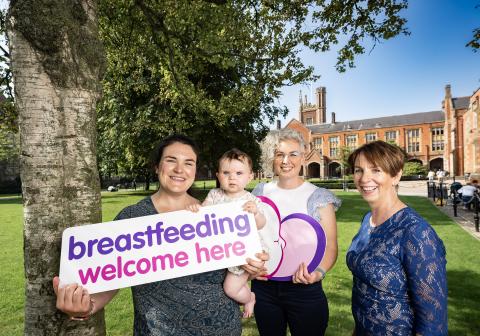Queen’s University shows support for breastfeeding mums

Queen’s University Belfast has become the latest organisation to join the Public Health Agency’s (PHA) Breastfeeding Welcome Here scheme – a programme that aims to increase the number of premises which actively show support to breastfeeding mums.
This new membership represents a huge support network to breastfeeding mums who are working, studying or visiting the university.
In joining this scheme, Queen’s has pledged that:
- breastfeeding is welcome across its campus;
- a mum who is breastfeeding will not be asked to move or stop breastfeeding;
- all staff will be made aware of the scheme and that the university is supportive of the needs of any breastfeeding mums;
- Queen’s will display the Breastfeeding Welcome Here window stickers and certificates throughout its campus.
Between 2010-2020 the initial rates of breastfeeding in Northern Ireland rose from 45% to 50%, however there is a big drop off, with only 21% of babies receiving breastmilk at six months old. Feedback indicates that this is often because there is lack of support, particularly when feeding outside of the home, with nine out of ten mothers stopping before they intended.
Dr Hannah McCourt, Senior Health and Social Wellbeing Improvement Officer with PHA, said: “The PHA is delighted to have Queen’s University as a member of the Breastfeeding Welcome Here scheme. We all have a role in supporting breastfeeding mums and creating a supportive environment makes continuing to breastfeed more likely. Breastfeeding mums have the right to feed anywhere in public. Thankfully it’s rare for a mum to experience any open confrontation or critical comment or behaviour about them breastfeeding in public that causes them to feel uneasy. Breastfeeding Welcome Here venues have shown a commitment to provide that extra bit of support and make it clear to everyone that they actively welcome breastfeeding.
“The Breastfeeding Welcome Here scheme is an initiative that aims to provide supportive environments for mothers to breastfeed when they’re out and about in public places, particularly those who maybe feel apprehensive. The scheme, which started in 2005, is there to reassure women who want to breastfeed that there are businesses and organisations out there who have taken proactive steps to welcome breastfeeding mothers and show solidarity with them. This can often relieve pressure for a mum by showing there is a friendly environment where breastfeeding is normal and the needs of a breastfeeding mum will be met.
“Breastfeeding offers babies the best start in life and can be a very rewarding experience. As well as having all the nutrients a baby needs to grow and develop, human milk has very special ingredients such as antibodies, hormones and stem cells to help protect them now and in the future. Initiatives like Breastfeeding Welcome Here help to normalise breastfeeding and create the right conditions for mothers to breastfeed in comfort, wherever they are.
“Making it easier for mums to choose breastfeeding will help improve breastfeeding rates in Northern Ireland.”
Queen’s University will officially launch their involvement in the Breastfeeding Welcome Here scheme on Thursday 14 September at an event welcoming stakeholders, staff, students and visitors to the campus to learn more about the scheme and how it will support breastfeeding mums.
Dr Maria Healy, Senior Lecturer in Midwifery Education and Swan Champion, School of Nursing and Midwifery at Queen’s University, said: “It is a privilege to lead the rollout of this scheme across Queen’s as it enables the normalisation of breastfeeding within the University for students, staff, and visitors.
“We know that breastfeeding improves the health and wellbeing of both children and women and it is vital that breastfeeding mothers feel comfortable and confident. Having a supportive environment across Queen’s will make a huge difference to a large number of mothers and babies, and we want people to know that breastfeeding is welcome here.”
Queen’s staff member Sorcha Mac Laimhin who is currently breastfeeding her second child, 6 months old Meadhbh, said: “I’m really pleased to see the Breastfeeding Welcome Here scheme being launched at Queen’s. As a breastfeeding mother, it’s so important to be able to feed my baby anywhere I go and seeing the Breastfeeding Welcome Here stickers around campus makes me feel even more confident to do so.
“I’m really proud to know that Queen’s are promoting the scheme and that they are going out of their way to encourage breastfeeding mothers to feel comfortable on campus.”
Dr McCourt concluded: “Any business or organisation which is open to the general public is eligible to join the scheme, which currently includes over 800 cafes, restaurants, shops, council facilities, universities, tourist attractions and other public and private sector venues across Northern Ireland. Queen’s University joining the scheme is such a positive step for breastfeeding families. We believe that this will support and encourage breastfeeding mums to continue breastfeeding for longer.”
For more information visit www.breastfedbabies.org which provides a list of local businesses across Northern Ireland participating in the scheme.
- The PHA website www.breastfedbabies.org has information on the benefits of breastfeeding, advice and guidance on all aspects of feeding, expressing, problems, returning to work, weaning, guidance for employers and information on the Breastfeeding Welcome Here scheme. The site also has details of local support groups for breastfeeding mums.
- If any media organisation is interested in coming along to the launch event at Queen’s University on Thursday 14 September from 2pm, please contact orlaith.strong@hscni.net or call 0300 555 0117
